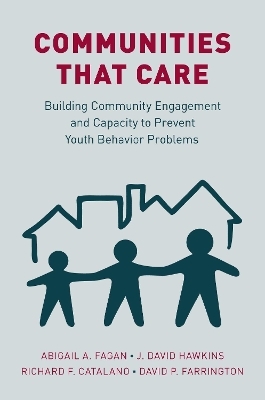
Communities that Care
Oxford University Press Inc (Verlag)
978-0-19-029921-7 (ISBN)
Scholars and policymakers increasingly call for evidence-based, prevention-oriented, and community-driven approaches to improve public health and reduce youth crime, substance use, and related problems. However, few functional models exist. In Communities that Care, four leading experts on prevention describe one such system to illustrate how communities effectively engage in prevention activities. Communities That Care (CTC) is a coalition-based prevention system implemented successfully in dozens of communities across the world that promotes healthy development and reduces crime rates for youth. Drawing on literature from criminology, community psychology, and prevention science this book describes the conditions and actions necessary for effective community-based prevention. The authors illustrate how effective community-based prevention can be undertaken by describing how the CTC prevention system has been developed, implemented, evaluated, and disseminated across the U.S. and internationally. Communities that Care shares invaluable lessons about the implementation and evaluation of community-level interventions and establishes a set of best practices for anyone seeking to engage in and/or evaluate effective prevention efforts.
Abigail A. Fagan is an Associate Professor in the Department of Sociology, Criminology & Law at the University of Florida. David Hawkins is the Endowed Professor of Prevention and Founding Director of the Social Development Research Group at the University of Washington School of Social Work. Richard F. Catalano is the Bartley Dobb Professor for the Study and Prevention of Violence at the School of Social Work, University of Washington and the co-founder of the Social Development Research Group. David P. Farrington is Emeritus Professor of Psychological Criminology at the Institute of Criminology at Cambridge University.
Preface by Francis Cullen
Chapter 1: Community-Based Prevention of Youth Behavioral Health Problems
Chapter 2: Theoretical Perspectives Guiding the Development and Evaluation of CTC
Chapter 3: The Development and Evaluation of CTC
Chapter 4: The Importance of Readiness and High-Functioning Coalitions in Community-based Prevention
Chapter 5: Improving Community Capacity to Conduct Comprehensive Prevention Needs Assessments
Chapter 6: Increasing the Use of Evidence-based Interventions to Reduce Youth Behavioral Health Problems
Chapter 7: Ensuring High Quality Implementation and Sustainability of Evidence-based Interventions and Coalitions
Chapters 8: Findings from the Community Youth Development Study
Chapter 9: A State-wide Effectiveness Trial of CTC in Pennsylvania
Chapter 10: The Future of CTC and Community-based Prevention
| Erscheinungsdatum | 18.12.2018 |
|---|---|
| Zusatzinfo | 16 illustrations |
| Verlagsort | New York |
| Sprache | englisch |
| Maße | 236 x 160 mm |
| Gewicht | 646 g |
| Themenwelt | Medizin / Pharmazie ► Medizinische Fachgebiete ► Psychiatrie / Psychotherapie |
| Studium ► Querschnittsbereiche ► Prävention / Gesundheitsförderung | |
| Recht / Steuern ► EU / Internationales Recht | |
| Recht / Steuern ► Strafrecht ► Besonderes Strafrecht | |
| Recht / Steuern ► Strafrecht ► Kriminologie | |
| Sozialwissenschaften ► Soziologie ► Allgemeine Soziologie | |
| ISBN-10 | 0-19-029921-5 / 0190299215 |
| ISBN-13 | 978-0-19-029921-7 / 9780190299217 |
| Zustand | Neuware |
| Informationen gemäß Produktsicherheitsverordnung (GPSR) | |
| Haben Sie eine Frage zum Produkt? |
aus dem Bereich


